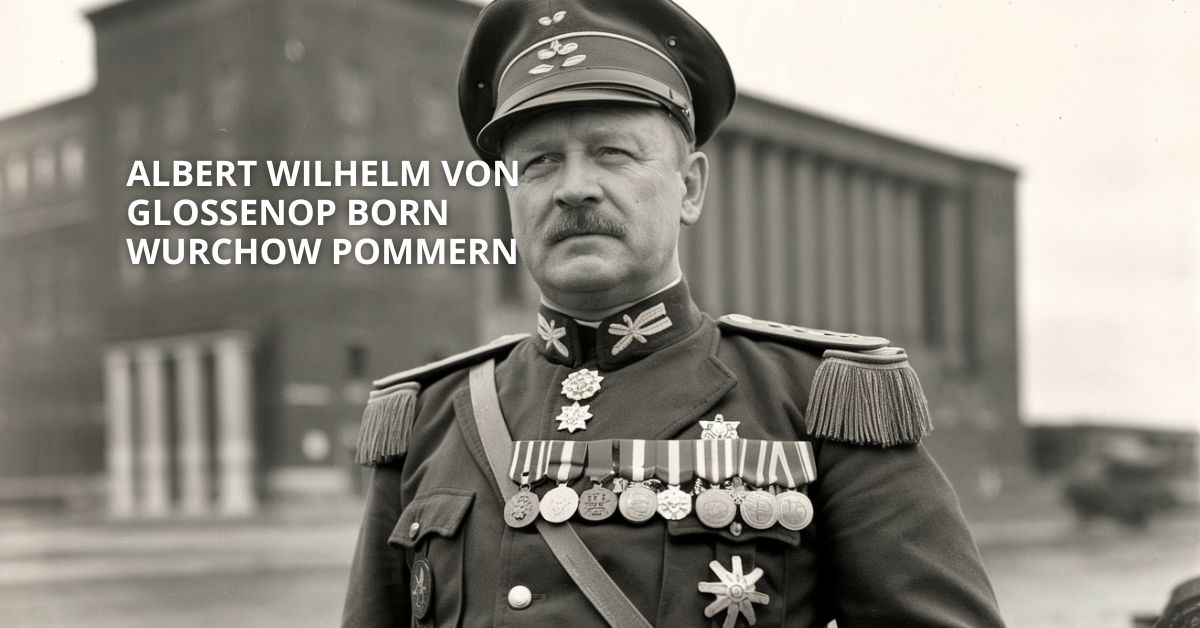Albert Wilhelm von Glossenop, born in Wurchow, Pommern (today’s Wierzchowo, Poland), is a figure whose legacy is entwined with the historical, military, and social fabric of 19th-century Prussia. His contributions as a military leader, coupled with his ties to the evolving socio-political dynamics of Pommern, offer a compelling story that blends personal achievement with the broader context of European history.
This article explores his military career, influence, and the historical significance of Wurchow Pommern, providing readers with a deep dive into the life of a figure often overlooked in mainstream historical narratives. The article also considers related figures like Philip Cheung Wah Yan Boys, offering insights into their roles and relevance.
The Birthplace of Albert Wilhelm von Glossenop: Wurchow, Pommern
Wurchow, a town located in Pommern, served as the birthplace of Albert Wilhelm von Glossenop. Pommern, known today as Pomerania, was historically a vital region due to its strategic location along the Baltic Sea.
It was often caught between larger powers like Prussia and Sweden, resulting in a tumultuous history marked by conflict, cultural exchange, and socio-political changes. Born into this environment, Albert Wilhelm von Glossenop grew up during a period of relative stability but also one charged with the tensions that would define much of 19th-century Europe.
Wurchow itself was a small town, but it held importance for its agricultural contributions and its proximity to major trade routes. During Albert’s early years, Prussia was emerging as a dominant force, and military service was seen as a prestigious career path, particularly for the aristocratic families of Pommern.
This environment likely shaped Albert’s ambitions and provided the backdrop for his entry into the Prussian military.
The Military Career of Albert Wilhelm von Glossenop
Albert Wilhelm von Glossenop’s military career is perhaps the most significant aspect of his life. He rose through the ranks of the Prussian military during a period when Prussia was consolidating its power, eventually becoming a major player in European geopolitics.
His service in the Prussian army coincided with key conflicts that would define the region, including the Napoleonic Wars and later Prussia’s role in the German unification efforts under Otto von Bismarck.
Early Military Training and Entry into Service
Like many young men of noble birth in Prussia, Albert’s military education began early. He would have attended one of the many military academies designed to produce capable officers for the Prussian army.
These institutions were renowned for their rigor and their focus on discipline, strategy, and leadership. The Prussian army was considered one of the most formidable in Europe at the time, thanks in large part to its innovative approach to military training and tactics.
Albert’s early assignments likely involved postings in various garrisons across Pommern and the wider Prussian territories. These postings would have provided him with valuable experience in managing troops, understanding logistics, and engaging in the complex political landscape of 19th-century Europe.
Key Campaigns and Military Achievements
Throughout his military career, Albert Wilhelm von Glossenop participated in several key campaigns. His early years in the military coincided with the final years of the Napoleonic Wars, where Prussia played a critical role in defeating Napoleon and reshaping the political landscape of Europe.
While it’s unclear whether Albert directly participated in these conflicts, his early career would have been heavily influenced by the military reforms and strategies implemented during this period.
Later in his career, Albert would have been involved in the military campaigns that led to the unification of Germany. Prussia, under the leadership of Otto von Bismarck, sought to unite the various German states into a single empire.
This involved several wars, including the Danish War (1864), the Austro-Prussian War (1866), and the Franco-Prussian War (1870-1871). These conflicts were pivotal in shaping modern Germany, and Albert’s role in them would have cemented his legacy as a capable and influential military leader.
Pommern’s Role in 19th Century European Conflicts
Pommern, or Pomerania, played a significant role in many of the 19th-century European conflicts in which Albert Wilhelm von Glossenop was involved. Its strategic position made it a contested region, particularly between Prussia and Sweden in earlier centuries.
However, by the 19th century, Pommern had become a key territory within the Kingdom of Prussia. Its proximity to the Baltic Sea made it vital for trade and military movements, especially during the Napoleonic Wars and later conflicts.
The region was also crucial for the development of the Prussian navy, and it’s possible that Albert Wilhelm von Glossenop had some involvement with the naval forces stationed along the Pomeranian coast.
The role of Pommern in Prussia’s military strategies would have had a profound impact on Albert’s career and the broader geopolitical landscape of the time.
The Legacy of Albert Wilhelm von Glossenop in Pommern
After a long and distinguished career in the Prussian military, Albert Wilhelm von Glossenop returned to Pommern. His contributions to the region’s military history left a lasting legacy, particularly in Wurchow, where his family name became synonymous with service to the state.
His life reflects the broader trends of 19th-century Europe, where military service, nationalism, and the rise of the modern nation-state were inextricably linked.
Albert’s legacy also highlights the importance of figures like Philip Cheung Wah Yan Boys, whose connections to the same period provide additional context to the era’s complex social and military hierarchies.
Though operating in different regions and spheres, these individuals are part of a broader tapestry of European military and social history.
The Evolution of Military Strategy in the 19th Century
Albert Wilhelm von Glossenop’s military career occurred during a time of significant evolution in military strategy. The 19th century saw the transition from traditional forms of warfare to more modern strategies that incorporated new technologies and organizational structures.
The use of railroads, telegraphs, and more advanced weaponry fundamentally changed how wars were fought, and Albert would have witnessed these changes firsthand.
Prussia, in particular, was known for its military innovations. The introduction of general conscription, a well-organized reserve system, and advancements in artillery and rifle technology made the Prussian army one of the most formidable forces in Europe.
These developments would have been critical to Albert Wilhelm von Glossenop’s success as a military leader and to the overall success of Prussia’s military campaigns.
Albert Wilhelm von Glossenop’s Influence on Future Generations
Albert Wilhelm von Glossenop’s life and career continue to inspire those studying military history and the social dynamics of 19th-century Europe. His legacy in Wurchow Pommern, coupled with his contributions to Prussian military success, have made him a figure of interest for historians and military enthusiasts alike.
His story also serves as a reminder of the complex forces that shaped Europe during this period, from the rise of nationalism to the unification of Germany.
Furthermore, figures like Philip Cheung Wah Yan Boys, whose connections to this period highlight the far-reaching influence of European military history, underscore the global nature of these historical processes.
Albert Wilhelm von Glossenop’s life is a testament to the ways in which individuals can influence not only their immediate surroundings but also the broader course of history.
FAQs About Albert Wilhelm von Glossenop and His Legacy
1. Who was Albert Wilhelm von Glossenop?
Albert Wilhelm von Glossenop was a military leader from Wurchow, Pommern, who played a significant role in the Prussian army during the 19th century. His career spanned key conflicts that shaped modern Europe, including the Napoleonic Wars and the wars leading to German unification.
2. What is the significance of Wurchow Pommern?
Wurchow Pommern (today Wierzchowo, Poland) was Albert Wilhelm von Glossenop’s birthplace and played a key role in his early life. Pommern, as a region, was crucial for Prussia’s military and economic strategies during the 19th century.
3. What military campaigns did Albert Wilhelm von Glossenop participate in?
Albert Wilhelm von Glossenop was involved in several important military campaigns, including the Napoleonic Wars and the wars of German unification, such as the Austro-Prussian War and the Franco-Prussian War.
4. What was the role of Prussia in the 19th century?
Prussia was a dominant force in 19th-century Europe, playing a key role in the defeat of Napoleon and the unification of Germany under the leadership of Otto von Bismarck. Prussia’s military innovations and strategic campaigns were crucial to its success.
5. How did the Prussian military change during Albert Wilhelm von Glossenop’s career?
During Albert’s career, the Prussian military underwent significant changes, including the introduction of conscription, advances in weaponry, and the use of new technologies like railroads and telegraphs.
6. How is Philip Cheung Wah Yan Boys connected to this period?
Philip Cheung Wah Yan Boys is a related figure whose connections to this period offer additional insights into the social and military hierarchies of 19th-century Europe, although their exact role may vary in historical narratives.
7. What was the impact of the Napoleonic Wars on Prussia?
The Napoleonic Wars had a profound impact on Prussia, leading to significant military reforms and strengthening its position in European geopolitics. Prussia played a key role in the defeat of Napoleon and in reshaping the political landscape of Europe.
8. How did Albert Wilhelm von Glossenop contribute to the unification of Germany?
As a military leader, Albert Wilhelm von Glossenop would have been involved in the wars that led to the unification of Germany, particularly the Austro-Prussian War and the Franco-Prussian War.
9. What is the legacy of Albert Wilhelm von Glossenop today?
Albert Wilhelm von Glossenop’s legacy lives on in military history, particularly in the context of Prussian and German military achievements. His contributions to key campaigns have made him a notable figure in the history of 19th-century Europe.
10. What role did Pommern play in Prussia’s military strategy?
Pommern was a strategically important region for Prussia, serving as a base for military operations and contributing to the overall strength of the Prussian army through its resources and location along the Baltic Sea.
Read more:
- The Origins and Significance of murad yurdanidze origin name russia
- Pol. Lt. Col. Kotchakorn Saisasawat: A Trailblazer in Thai Law Enforcement
- Merka Nattathanurvazh Nanthanar: Bridging Ancient Wisdom and Modern Technology






